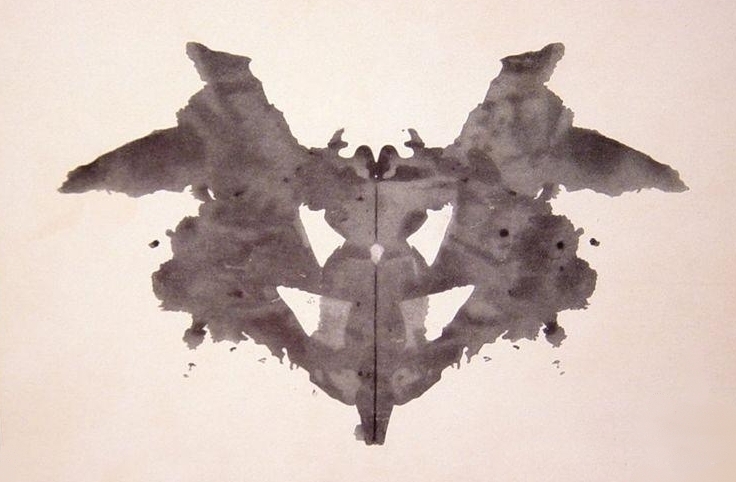
by Jaye B.
In October of 2016, I was diagnosed as having Schizoid Affective Disorder by a psychiatrist hired by Social Security in response to a disability claim I had made. I looked into the diagnosis and agreed overall with the assessment made. But before delving further into this, I'd like to share some of my background with you.
I'm a writer, artist and musician and made my publishing break writing art criticism back in the late 1980s. Artists would often come to me in tears at their gallery openings, thanking me profusely for being able to put in words what they were trying to convey through their artwork. I attribute this to what is called the 'detached observer' which has been defined as: exhibiting an aloof objectivity usually free from prejudice or self-interest.
Before going into an art gallery, I would try to make myself a 'blank slate' and set aside all my personal bias, assumptions, prejudices and allow myself to experience a work of art, whether it would be a painting, sculpture, film or dance enabling me to write my reviews in such an effective way. Using the 'detached observer' approach, I could gain a better understanding of what I was presented with on many levels. It is the detached observer approach that has helped me gain better understanding of my own struggles with mental illness and others as well, as you will see.
I started posting videos of myself in schizophrenic states on a You Tube channel I had back in 2017 and have since then taken it down. During these schizophrenic episodes, I would witness them as a detached observer which enabled me to video record the experiences in the first place and thought nothing of how people would respond.
The response I got was one of dead silence. People unsubscribed from my channel and told me to remove them from my mailing list. Those that were sending me money to support my work stopped doing so. I wanted to believe that these reactions were the exception to the rule, but after doing reality checks with other people suffering from mental illness, I found out that this, sad to say, is the norm. We are judged, branded, scorned, scapegoated and then swept away to the far edges of society, all too often drugged and locked up. Why is this? Because there is little to nothing in our society, culture and educational systems that supports and encourages a compassionate, empathetic approach to those struggling with schizophrenia.
The cold response I received from people in the medical field ( and that includes psychiatrists) made me wonder if doctors are even required to take the Hippocratic oath any more. Especially noteworthy is #4 in the modernized version of the oath first drafted by Hippocrates back in ancient Greek days:
I will remember that there is art to medicine as well as science and that warmth, sympathy and understanding may outweigh the surgeon's knife or the chemist's drug.
Such a warm, sympathetic and loving approach is deliberately discouraged these days, no surprise, seeing that nearly every aspect of our lives have become corporatized-run like a business with the bottom line being the only thing that matters.
So now, it is time to start examining this in further detail but before proceeding any further, I must emphasize that what I'm about to lay out next only be practiced with those you know personally -in your circle of family, friends, relations. Never let your guard down with random crazies you may meet on the street. Remember: Be wise as serpents and innocent as doves.
In response to the chill reception to my videos, I posted a rebuttal and did my best to convey that a schizophrenic's 'craziness' is nothing more than an electrified, barb wired fence designed to protect our deeply wounded selves and not make ourselves vulnerable. (it is most noteworthy that the word 'vulnerable' comes from the Latin word vulnus meaning wound.) It requires intuitive deftness and heightened awareness to navigate through this firewall defense system and begin to listen to what is really trying to be conveyed by the schizophrenic. The warmth, sympathy and understanding, Hippocratic oath wise, will help greatly with developing the skills to listen on many levels: body language, color and tone of voice, intuitively and instinctually as well.
The schizophrenic, being highly empathic, i.e. showing an ability to understand and share the feelings of another, will then let down their guard a bit and allow you into their world. Schizophrenics have an instinctual intelligence that is very well developed and they know on this level whether or not they can trust you. Establishing a foundation of trust with the schizophrenic is most important otherwise the electric fence gets switched back on and the schizophrenic will then isolate themselves when greeted with the usual coldness. Often with fatal consequences. The suicide rate, according to the World Health Organization, is now over one million people a year, two suicides a minute with a sobering prediction that there will be four suicides every minute in 2020.

When you employ the detached observer approach, try picturing the mentally ill person up on a movie screen or on a stage with a good forty yards distance between you and them. This will help create a safety zone and will help with diminishing mere reaction and encouraging, in its place, compassionate pro action. I certainly got tested recently, having met a 'crazy' woman out in the desert that was obsessed with washing rocks. She came to my campsite while I was playing guitar and I saw a beautiful, intelligent, smiling woman before me. Then, after playing more of my songs for her, I walked with her back to her campsite and saw her flip side. She said something very disturbing when I had my back turned to her and I found myself reacting.
"Well, I better get going." I said and walked quickly away. As I neared my camp site, I heard this disembodied something say to me: "What about this detached observer thing you are trying to promote?" So I did my best to walk my talk and pictured her on a movie screen and saw that all the craziness she was expressing at her campsite was outside of herself. I saw all these cracks in her energy field. ( It is interesting that the word crazy originally meant: full of cracks.) Then I saw her authentic self through her own version of the barbed wired defense system described above. I then wrote a song about her called, A Light All Its Own, rolled up the lyrics and put them into a plastic tube I decorated and tied it to a creosote bush above the rock garden she had made after she had left because I wanted to remember her as the kind and loving person that she really is.

I've come to the conclusion that schizophrenia is a language, no different than French, German or Spanish that requires unlearning, deconditioning and being a detached observer as well in order to fully understand. (I'm tempted to write The Berlitz Guide to Schizophrenese). We must not take some of the disconcerting, bizarre, inappropriate things a schizophrenic says and does literally. Rather we must look at what is trying to be expressed, metaphorically, poetically, often in puns and non sequiturs. Note that the word metaphor comes from the Latin - metapherein, meaning 'to transfer' perhaps transferring us from the literal to a more poetic and expansive realm. If a schizophrenic says that they have ants crawling out of their skin, it would be best to see that it is something else that is really trying to surface and it isn't literal ants, perhaps an unresolved issue or a repressed anxiety that needs to be given expression. In order to better understand this strange language, look at your own dreams and how bizarre and at times disturbing they can be. It is a way that our unconscious minds communicate with us, that bypasses our literal minded conditioning, i.e. so called 'rationality' so we can more effectively 'get' the message being conveyed to us and respond accordingly.
Now, I'm going to dare share with you something I wrote while in a schizophrenic state:
I saw him take this talking laxative bulb and start pooping all over the place, piles of it everywhere, some a hundred feet high. I guess that is better than getting ones soul trapped in a coyote skull or severing ones private parts and sending them up a river.

Well, I just lied to you. What I wrote is a paraphrase of one of many equally bizarre exploits that come straight out of the Trickster myths of the Winnebago Indians, part of an oral tradition that was passed down from generation to generation. Not to be taken literally at all. Much of it was designed to actually make listeners laugh and get them to open up. Byrd Gibbens, Professor of English at University of Arkansas observes that 'laughter opens and frees one from rigid preconception' a necessary prerequisite indeed for effective communication to take place. So perhaps if we laugh and lose our rigid preconceptions in regards to schizophrenics's crazy utterances, it is a good start to understanding the language that they are speaking in and they will let their guard down somewhat and start to reveal their authentic selves more and more.
2.
The notion of allowing one to give expression to craziness in a theatrical way has helped me with my own struggles with mental illness. Using my skills as a performance artist garnered in the '80s, I would often make theater of my own craziness as I did in the You Tube videos. At the time, one of my personal favorite hero/artists was, and still is, a guy named Antonin Artaud, a 'French dramatist, poet, essayist, actor, and theater director, widely recognized as one of the major figures of twentieth-century theater and the European avant-garde.'

He wrote a very provocative essay called, Vincent Van Gogh - The Man Suicided by Society. And whenever I look at that title, I see Fill-In-The-Blank Suicided by Society. Artaud had a perceptual lucidity that was quite threatening to those holding power.
He would say things like:
A vicious society has invented psychiatry to defend itself from the investigations of certain superior lucid minds whose intuitive powers were disturbing to it.
In its asylums, society has managed to strangle all those it has wished to rid itself of or to defend itself from, because they refused to make themselves accomplices to various flagrant dishonesties. The few lucid, well-disposed people who have had to struggle on this earth, see themselves at certain hours of the day and night from the depths of various phases of authentic recollected nightmare, overwhelmed by the powerful suction of the formidable, tentacle-like oppression of a kind of civic bewitchment which soon openly expresses itself in the general conventions.
No surprise at all that Artaud ended locked up in an insane asylum and subjected to barbaric electroshock treatments because he had the courage to spout such provocative stuff on the radio during WWII as well as in his plays.
Most ironic of all is that after Antonin was released from the asylum, there was a premiere of one of his plays in Paris. Dirty, disheveled, hebephrenic and barefoot, Artaud was barred entry to the theater and spent the entire night circling the building. It is such a fitting image of the plight of the empathic, creative, original and independent individual in our current times, barred entry to their very own creations because they see through societal b.s. like Artaud did.
3.
According to the Websters dictionary, the word 'integrity' means: the state of being whole and undivided. And integrity is what the schizophrenic yearns for indeed. So if we treat the person suffering from mental illness with integrity and focus on what is whole and undivided within them, it will help greatly in the healing process.
Treating one with dignity is also essential. Dignity has been defined as: the state or quality of being worthy of honor or respect. Yet integrity and dignity are sorely lacking these days because they are deliberately discouraged for the same reasons that compassion and empathy are. Rare are the people that honor and respect a schizophrenic's intuitive insights. Only those who aren't threatened and can see through the barbed wire defense system will treat schizophrenics with integrity and dignity.
I keep emphasizing this throughout because there have been times that I myself have been treated as less than human in subtle and not so subtle ways by those who I've dared reveal to that I'm homeless and struggling with mental illness.
Yet, there are a few rare individuals who have been the exception to this pervasively callow treatment of troubled souls:
About a month after I was diagnosed as being schizophrenic, I found myself, one morning, in a McDonalds on Lake Street in Minneapolis along with other homeless people trying to warm up after a bitter cold night . A very dirty, tattered looking bum, talking to himself, triggered me to leave and get back in my car. I took a credit card, scraped the frost from my windshield enough so I could see and found myself driving south through Saint Paul, then down 35W. I then found myself heading west through South Dakota. The next day, through Colorado. A few days later I ended up in a small town south of Death Valley. It was there that I met two women who worked at a community center there. After sharing some of the experiences described above with them, one said to me the following:
We can't heal what we can't feel.
Her co-worker wrote what she said down on a Post It note and handed it to me. This initiated what has turned out to be a most profound healing experience because they were treating me with dignity, and perhaps seeing the integrity that was underneath all my craziness. They did not constrict, judge, scorn or merely react to my condition, but proacted with compassion and empathy instead.
In retrospect, it was like something had guided me to Death Valley in the first place, seeing the profoundly dissociated state I was in all throughout the westward trip. The only choice I had back in Minneapolis was either leave because of the coldness I was greeted with or check myself into a hospital there because one morning I found myself wandering down some railroad tracks looking for a place to sleep, not really knowing why.
So, with this in mind, I ask you to treat those with mental illness with integrity and dignity and trust that a healing will indeed occur, for yourself as well.
I will share my testimony of healing in Schizophrenic: It Takes One to Know One: Part II and I've used my own creative powers to do so.

Jaye B. is a writer, musician and artist. His art criticism has appeared in Art Paper, New North Artscape, Art Muscle, Northfield Magazine and elsewhere. His articles have also appeared in City Pages, Twin Cities Reader, Mysteries Magazine, Fahrenheit San Diego, High Plains Reader, New Dawn, and Rain Taxi. He has appeared on BBC Radio, WGN Chicago, Red FM Ireland, WLW Cincinnati, The Howard Stern Show, The Daily Show and other places in the mediasphere to discuss his work. You can help him out @ Donate
E=mail comments to: myristicin@hotmail with story title in subject.
Thanks for supporting viewzone in this time of censorship and tyranny.